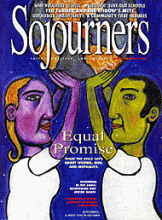EDDIE SOTO’S LETTER ("Letters," November-December 1997), commenting on "Turning the World Upside Down" by Aaron Gallegos, surfaces an issue that is quite relevant to the discussion about the role of liberation theology in the practice of our faith today. But the problem is actually rooted in conflicting views of our priorities as followers of Jesus Christ.
The working model of today’s world is of individuals whose ties to each other can be loosely described as something like "bonds of charity." Today, individualism is the dominant model and in these terms, the letter writer’s preoccupation is real.
Liberation theology not only challenges this impersonal view of our Christian priorities, but also correctly places the emphasis on Jesus, who dedicated his ministry to leading his followers to the eternal godhead through service to others. In the strictest sense, "acts of charity" are actually meaningful only when we have already fulfilled the conditions that fundamental justice imposes on us.
Formal religion that salves the conscience of the comfortable and feeds the dreams of the oppressed may be the secret to a successful church business today. But such religion says nothing to a world that condemns 60 percent of its population, especially its weakest members, to a life of abject poverty. And it’s with these poor, as liberation theology tells us, that we find the real Jesus today.
Read the Full Article
